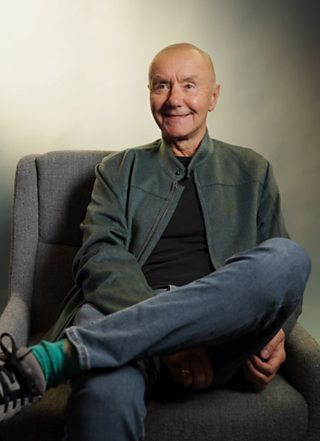Irvine Welsh: Seven things we learned when he spoke to Kirsty Young
In her Βι¶ΉΤΌΕΔ Radio 4 podcast Young Again, journalist and broadcaster Kirsty Young asks fascinating people what advice they would like to give their younger self.
Irvine Welsh’s first novel, Trainspotting, became one of the defining books of the 1990s. He’s gone on to write 13 more novels, including Filth, Porno, and his latest, Resolution, as well as short stories, films, and plays. He speaks with Kirsty about getting a criminal record at eight, what drives him, and why he only goes to women for advice. Here are seven things we learned.
-
![]()
Young Again: Listen to this episode on Βι¶ΉΤΌΕΔ Sounds
Young Again: What advice Irvine Welsh give to his younger self?

1. He wouldn’t change his negative experiences
Addiction has been a recurring theme in Irvine’s work, in part drawing from his own life. He was a heroin user for about two years in his youth. He calls it “a learning experience that you can use for the rest of your life.” He wouldn’t go back and try to stop himself doing it.
It was quite a thing to be eight years old and have a criminal record.
“I don’t think old people should be telling young people anything,” he says. “Life is experiential. You understand it as you experience it, and you learn from those experiences. It’s not about pain avoidance. You have to have negative experiences. We’ve medicalised every condition. We’ve catastrophised everything. We feel almost violated now if we feel any pain or discomfort, but pain and discomfort are about growth and growth is about being a human.”
2. He had a criminal record from the age of eight
Growing up in Edinburgh, Irvine was arrested frequently, the first coming very early in life, when he was charged for playing football in the street. “It was quite a thing to be eight years old and have a criminal record,” he says.
“We were taken up to court and the judge had the sense to be really embarrassed about it. He was very angry at the cops that arrested us and charged us. We were admonished, but it was still on my record.” Later, he says, arrest became almost a habit. “In my teens to early twenties, I thought, ‘It’s the weekend, so I’m going to end up in a cell at some point.’ It would be intoxicated bad behaviour.”
3. He's driven by curiosity
Irvine says his repeated run-ins with the law were in part because he’s always wanted to experience as much as possible, even when it gets him in trouble. “I’ve always seen myself as a learning machine,” he says. “I’ve always wanted to add to myself in terms of the things I want to experience: the people I want to meet, the places I want to go, the areas I want to move into… I think you can only do that with confidence if you maintain your essence.”
His essence is the same as when he was a boy. “I’m curious about things. I’m not just curious in a dilletante way. I’m curious in a kind of immersive way. I want to get right into them.”
4. He didn’t believe in marriage, but has been married three times
“Strangely, for someone who’s been married three times,” says Irvine, “I don’t actually believe in marriage. I don’t have any kind of interest in it at all.”

He says his first marriage was due to “parental pressure” and the second because he was in love with an American and they needed to marry to live in the same country. “The third time, I thought, ‘I’m madly in love with this woman. I’ve married two other people. This one’s for me.’ This one’s driven by my desire to get married, to make a romantic statement and tell the world I’m crazy about this woman.”
5. He was an unplanned child
Irvine has no children and has never wanted any. “I like the romance of being with someone, and I think the romance of a relationship kind of goes when kids are involved. I think it’s maybe the only-child competitiveness in me – not wanting a competitor around for attention!”
Irvine’s mother told him he was an unplanned child, which he thinks affected his view of parenthood, although not necessarily negatively. “It made me feel, the way mothers can, completely loved and exalted, but also superfluous to requirements.” He says his parents were so madly in love that it made him feel “like an outsider”, but also made him “aspire to romance” as all-consuming as theirs.
6. He wasn’t fazed by fame
The success of Trainspotting, and the subsequent 1996 film, made Irvine incredibly famous. Just 28 when the film came out, he felt ready for it. “I was quite good at understanding that level of fame,” he says. “I knew that the bad things that came out of it would overbear the good. You get asked to a lot of nice parties. You sleep with nicer people. You get nicer tables at restaurants… but that comes at a price. People feel entitled to intrude in a way they wouldn’t do with a stranger.”
In his early twenties, Irvine had played in punk-rock bands in Soho, with not much success. That turned out to be a blessing, fame-wise. “I was really fortunate… I’d failed as a musician. I’d failed at every other type of creative endeavour. By the time I was 30, I was kind of ready for it. I think you ossify at the age you become famous. You get trapped in that age.”
7. He only goes to women for advice
Asked who he turns to when he needs advice, Irvine says he considers advice a complex thing. “We have to be emotionally ready for it,” he says. “You can convince someone intellectually that shooting heroin is a bad thing… But you have to be ready. You have to see things like drug addiction, divorce, bereavement, loss of people, as not so much opportunities for change, but opportunities for growth.”
When he wants advice, he doesn’t go to his oldest friends. “I love them to bits, but they’re the last people I’d go to… They’ll say, ‘Have a drink!… I always go to women friends. They operate on a much more emotionally sophisticated level. You get better advice from them than you do from your guy pals.”






